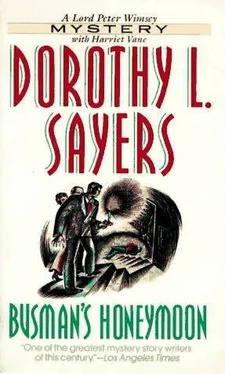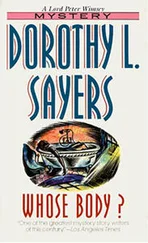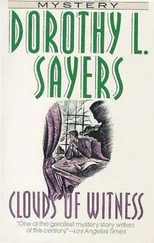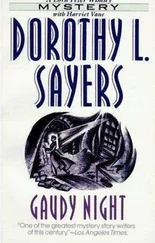Dorothy Sayers - Busman’s Honeymoon
Здесь есть возможность читать онлайн «Dorothy Sayers - Busman’s Honeymoon» весь текст электронной книги совершенно бесплатно (целиком полную версию без сокращений). В некоторых случаях можно слушать аудио, скачать через торрент в формате fb2 и присутствует краткое содержание. Жанр: Детектив, на английском языке. Описание произведения, (предисловие) а так же отзывы посетителей доступны на портале библиотеки ЛибКат.
- Название:Busman’s Honeymoon
- Автор:
- Жанр:
- Год:неизвестен
- ISBN:нет данных
- Рейтинг книги:4 / 5. Голосов: 1
-
Избранное:Добавить в избранное
- Отзывы:
-
Ваша оценка:
- 80
- 1
- 2
- 3
- 4
- 5
Busman’s Honeymoon: краткое содержание, описание и аннотация
Предлагаем к чтению аннотацию, описание, краткое содержание или предисловие (зависит от того, что написал сам автор книги «Busman’s Honeymoon»). Если вы не нашли необходимую информацию о книге — напишите в комментариях, мы постараемся отыскать её.
Busman’s Honeymoon — читать онлайн бесплатно полную книгу (весь текст) целиком
Ниже представлен текст книги, разбитый по страницам. Система сохранения места последней прочитанной страницы, позволяет с удобством читать онлайн бесплатно книгу «Busman’s Honeymoon», без необходимости каждый раз заново искать на чём Вы остановились. Поставьте закладку, и сможете в любой момент перейти на страницу, на которой закончили чтение.
Интервал:
Закладка:
Agnes Twitterton, an excited and spiteful witness, whose very obvious resentment against the prisoner did him if anything more good than harm. Dr James Craven, a highly technical witness. Martha Ruddle, a talkative and circumlocutory witness. Thomas Puffett, a deliberate and sententious witness. The Rev Simon Goodacre, a reluctant witness. Lady Peter Wimsey, a very quiet witness. Mervyn Bunter, a deferential witness. P.C. Joseph Sellon, a witness of few words. Superintendent Kirk, an officially impartial witness. A strange ironmonger from Clerkenwell, who had sold the prisoner a quantity of lead shot and an iron chain, a damaging witness. Then, the prisoner himself, witness in his own defence: a very bad witness indeed, sullen and impudent by turns.
Sir Impey Biggs, eloquent on behalf of the prisoner-‘this industrious and ambitious young man’; hinting at prejudice-‘a lady who may have some cause to fancy herself ill-used’; indulgently sceptical about ‘the instrument of destruction so picturesquely constructed by a gentleman whose ingenuity is notorious’; virtuously indignant at the construction placed upon ‘words uttered at random by a terrorised man’; astonished to discover in the case for the Prosecution ‘not a scintilla of direct proof’; passionately moving in his appeal to the jury not to sacrifice a young and valuable life on evidence so flimsily put together.
Counsel for the Prosecution, gathering up the threads of proof that Sir Impey had tossed into disorder, weaving them into a rope as thick as a cable.
The Judge, undoing the twist again to show the jury exactly what was the strength of each separate strand, and handing the materials back to them, neatly assorted.
The Jury, absent for an hour.
Sir Impey Biggs came over. ‘If they hesitate all this time, they may acquit him in spite of himself.’
‘You ought to have kept him out of the box.’
‘We advised him to stay out. I think he got swollen head.’
‘Here they come.’
‘Members of the jury, are you agreed upon your verdict?’
‘We are.’
‘Do you find the prisoner guilty or not guilty of the murder of William Noakes?’
‘Guilty.’
‘You say he is guilty and that is the verdict of you all?’
‘Yes.’
‘Prisoner at the bar, you have been arraigned upon a charge of murder, and have placed yourself upon your country. That country has now found you guilty. Have you anything to say why judgement of death should not be pronounced upon you according to law?’
‘I say I don’t care a damn for the lot of you. You’ve proved nothing against me. His lordship’s a rich man and he had a down on me-him and Aggie Twitterton.’
‘Prisoner at the bar, the jury, after a careful and patient, hearing have found you guilty of murder. In that verdict I entirely concur. The sentence of the court upon you is that you be taken from hence to the place from which you came, and thence to a place of execution, and you be there hanged by the neck until you be dead and your body buried in the precincts of the prison in which you shall last have been confined, and may the Lord have mercy upon your soul.’
‘Amen.’
One of the most admirable features of the English criminal law is said to be its dispatch. You are tried as soon as possible after your arrest, the trial takes three or four days at most, and after your conviction (unless, of course, you appeal), you are executed within three weeks.
Crutchley refused to appeal, preferring to announce that he done it, that he’d do it again, and let them get on with it, it made no odds to him. Harriet, in consequence, was left to form the opinion that three weeks was quite the worst period of waiting in the world. A prisoner should be executed the morning after his conviction, as after a court-martial, so that one could get all the misery over in a lump and have done with it. Or the business should be left to drag on for months and years, as in America, till one was so weary of it as to have exhausted all emotion.
The worst feature, she thought, about those three weeks, was Peter’s determined courtesy and cheerfulness. Whenever he was not over at the county gaol, patiently inquiring whether there was anything he could do for the prisoner, he was at Talboys, being considerate, admiring the arrangement of the house and furniture, or putting himself at his wife’s disposal to tour the country in search of the missing chimney-pots or other objects of interest. This heartbreaking courtesy was punctuated by fits of exigent and exhausting passion, which alarmed her not only by their reckless abandonment, but by being apparently automatic and almost impersonal. She welcomed them, because he would sleep afterwards as though stunned. But every day found him more firmly entrenched behind some kind of protective fortification, and herself becoming less and less a person to him. In his present mood, she felt unhappily, almost any woman would have done.
She was unspeakably grateful to the Duchess, who had forewarned and so, to some extent, forearmed her. She wondered whether her own decision ‘not to be wifely and solicitous’ had been a wise one. She wrote, asking for counsel. The Duchess’s reply, ranging over a variety of subjects amounted to saying ‘Let him find his own way out’ A postscript added: ‘One thing, my dear- he is still there , and that’s encouraging. It’s so easy for a man to be somewhere else.’
About a week before the execution, Mrs Goodacre turned up in a state of considerable agitation. ‘That wretched man Crutchley!’ she said. ‘I knew he would get Polly Mason into trouble, and he has. And now what’s to be done? Even supposing he could get leave to marry her and wanted to do it-and I don’t suppose he cares a rap for the girl-is it better for the child to have no father or one who’s been hanged for murder? I’m sure I don’t know! Even Simon doesn’t know-though naturally he says he ought to marry her. I don’t see why he shouldn’t-it won’t make the least difference to him. But now the girl doesn’t want him to, either says she doesn’t want to be married to a murderer, and I’m sure I can’t blame her. Her mother’s in a great way, of course. She should have kept Polly at home or sent her into good service-I told her she was much too young to go into that drapery shop at Pagford, and not really steady, but it’s too late to say that now.’
Peter asked whether Crutchley knew anything about this development.
‘The girl says not… And goodness me!’ said Mrs Goodacre, suddenly waking up to a whole series of possibilities, ‘suppose old Mr Noakes hadn’t lost his money and Crutchley hadn’t been found out, what would have happened to Polly? He meant to have that money by hook or by crook… if you ask me, my dear Lady Peter, Polly’s had a narrower escape than she thought for.’
‘Oh, it mightn’t have come to that,’ said Harriet.
‘Perhaps not; but one undiscovered murder makes many. However, that isn’t the point. The point is what we’re to do about this baby that’s on the way.’
Peter said he thought Crutchley ought at least to be told about it. He thought it was only fair that the man should be given the chance to do what he could. He offered to take Mrs Mason over to see the governor of the prison. Mrs Goodacre said it was very good of him.
Harriet, escorting Mrs Goodacre down the path to the gate, said it would do her husband good to have something definite to do about Crutchley: he worried a good deal.
‘Very likely he does,’ said Mrs Goodacre. ‘You can see he’s that sort. Simon’s just the same if he has had to be severe with anybody. But that’s men all over. They want the thing done and then, of course, they don’t like the consequences. Poor dears, they can’t help it. They haven’t got logical minds.’
Читать дальшеИнтервал:
Закладка:
Похожие книги на «Busman’s Honeymoon»
Представляем Вашему вниманию похожие книги на «Busman’s Honeymoon» списком для выбора. Мы отобрали схожую по названию и смыслу литературу в надежде предоставить читателям больше вариантов отыскать новые, интересные, ещё непрочитанные произведения.
Обсуждение, отзывы о книге «Busman’s Honeymoon» и просто собственные мнения читателей. Оставьте ваши комментарии, напишите, что Вы думаете о произведении, его смысле или главных героях. Укажите что конкретно понравилось, а что нет, и почему Вы так считаете.












